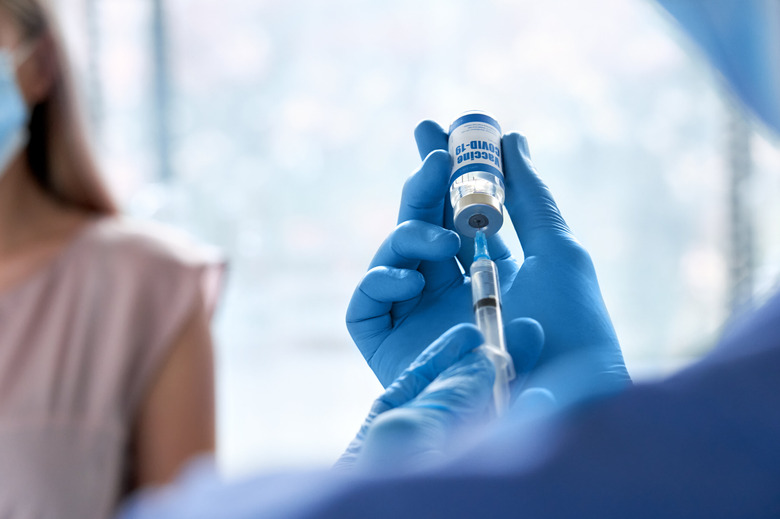We Finally Know How J&J's One-Shot Coronavirus Vaccine Efficacy Compares To Two-Dose Vaccines
- Johnson & Johnson announced that its coronavirus vaccine candidate is highly effective against COVID-19 complications and death. However, the efficacy rate varies depending on the country, and it's lower than the Pfizer/BioNTech and Moderna drugs.
- The company said the vaccine was able to protect against severe coronavirus illness that can lead to hospitalization and death. The one-dose drug has been well-tolerated in Phase 3 trials, and no allergic reactions were observed.
- The drug also showed proven effectiveness against the South African B.1.351 mutation, a new coronavirus strain that can evade some drugs and reduce existing vaccines' effectiveness.
- The J&J drug will be submitted to the FDA for Emergency Use Authorization next week, with the US having already preordered 100 million doses.
More than 86.14 million people received at least one COVID-19 vaccine dose as of January 28th, including 26.19 million Americans. But only 8.29 million people are fully vaccinated at this time, including 4.26 million people in the US. That's because the number of available vaccines that are effective against the novel coronavirus is limited, and production issues as well as vaccination policies still hinder immunization campaigns. Things will hopefully soon improve, as another highly anticipated COVID-19 vaccine candidate has cleared Phase 3 trials successfully, with an Emergency Use Authorization (EUA) review to follow next week.
That's the Johnson & Johnson vaccine candidate that has a few key advantages over the Pfizer/BioNTech and Moderna drugs. That said, the vaccine isn't as highly effective as the two mRNA drugs that are already in use.
J&J said in a press release that its vaccine candidate is highly effective against severe COVID-19. The company also presented results for different regions. While the percentages below are lower than the 95% effectiveness of the BioNTech and Moderna vaccines, the J&J vaccine was actually being tested in regions where new COVID-19 strains were becoming dominant. As a result, the company knows exactly how effective the drug is against the troubling South African mutation. Here are the numbers:
- 72% effective in the US
- 66% effective in Latin America
- 57% effective in South Africa (B.1.351 mutation)
- 66% effective overall at preventing moderate to severe COVID-19 28 days after vaccination
- 85% effective overall at preventing severe COVID-19, and complete protection against COVID-19 hospitalization and death as of 28 days after vaccination
The vaccine requires one single dose and can be stored at normal refrigeration temperatures, which are both advantages over mRNA vaccines from Pfizer and Moderna. Despite the lower efficacy, the vaccine can be very useful at reducing transmission, especially at a time when there's not enough vaccine supply to meet demand.
Johnson & Johnson said that the protection starts 14 days after the jab, and it was 85% effective at preventing severe disease across all regions at 28 days. The efficacy against severe disease increases over time, and there were no cases observed 49 days after injection. The drug works well across different age groups, with the company having recruited 43,783 volunteers across various geographies for the Phase 3 trial. The trial covered eight countries on three continents, with 34% of volunteers over 60.
Here's how J&J defines severe COVID-19 compared to Moderna:
In the study, the definition of severe COVID-19 disease included laboratory-confirmed SARS-CoV-2 and one or more of the following: signs consistent with severe systemic illness, admission to an intensive care unit, respiratory failure, shock, organ failure or death, among other factors. Moderate COVID-19 disease was defined as laboratory-confirmed SARS-CoV-2 and one or more of the following: evidence of pneumonia, deep vein thrombosis, shortness of breath or abnormal blood oxygen saturation above 93%, abnormal respiratory rate (≥20); or two or more systemic symptoms suggestive of COVID-19.
The drug is 100% protective against death, according to Dr. Mathai Mammen's comments to CNN. Mammen is the global head of research and development at Johnson & Johnson. "We are right now completely protective, it would appear 100% protective, against disease that actually does make you go to the hospital, we're 100% protective against death," the exec said.
As for side-effects, the Data and Safety Monitoring Board (DSMB) overseeing the trial has not reported any significant safety concerns, with the dose being generally well tolerated. Adverse effects can include fever (9%) and Grade 3 fever (0.2%). The report notes that serious adverse effects were observed in the placebo group, without disclosing what they were.
No anaphylaxis was observed, which might be another advantage over mRNA vaccines. The J&J drug uses an attenuated adenovirus to deliver the spike protein of the coronavirus into the body. The immune system will then target this key viral component just like the mRNA drugs. The vaccine uses the same platform as the Ebola vaccine that the European Commission approved and other vaccines J&J's Janssen pharma division is working on.
Addressing the Johnson & Johnson vaccine results, Dr. Anthony Fauci acknowledged to CNN that the only thing hurting the J&J drug is the inevitable comparison to the mRNA vaccines' 95% efficacy.
"A vaccine that's inexpensive, that's a single dose, and that has no cold chain requirements — that's pretty good," Fauci said. "You know what the problem is? If this were out there and we didn't have the Moderna 94-95% .... We would have said wow, a 72% effective vaccine that's even more effective against severe disease is really terrific."
Fauci continued, "But now we're always judging it against 94 to 95%. Having said that, this is a vaccine that could have use particularly in developing countries to keep people out of the hospital. It has a very good efficacy against severe disease."
J&J will also test a two-dose vaccine regimen to determine whether the overall efficacy can be increased. In the meantime, the US already ordered 100 million doses of the one-shot drug.
